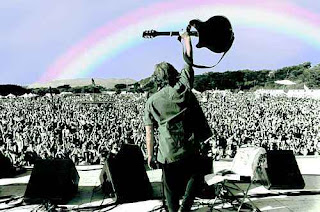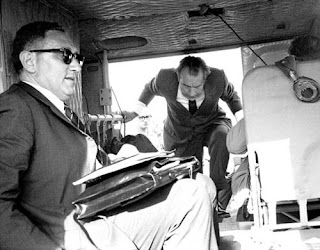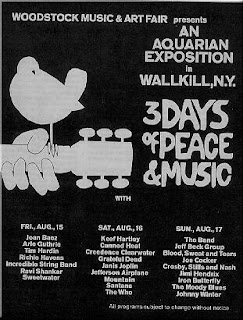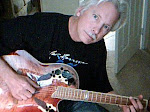
My first semester of college ended quietly that month. I came home for the Christmas break. Above is a photo of my brother Tom and I taken a year or two later - he's playing my new banjo "Norma" which I still have.
I did generally poorly at my studies and received a notice from the administration that I was being put on probation. For the second semester, I decided to take only courses that appealed to me - most of them having to do with the arts. I signed up for an art course, a piano course, and a theater course - and my life changed in an instant. That Spring, I became a Theater Major.
I did generally poorly at my studies and received a notice from the administration that I was being put on probation. For the second semester, I decided to take only courses that appealed to me - most of them having to do with the arts. I signed up for an art course, a piano course, and a theater course - and my life changed in an instant. That Spring, I became a Theater Major.
The first draft lottery took place on December 1. Designed to offer a measure of fairness to the nation's draft system, the new lottery determined the order of call for induction into the armed services based on "the luck of the draw" - if your birth date was drawn as a low number, your chances of being drafted increased. Those with very low numbers were certain to be drafted.
This first lottery covered those born between 1944 and 1950, so I wasn't affected, but if I had been, my birthday came up at the very bottom - 354. I wasn't so lucky the next year when 1951 was drawn - my birthday came up at #12 - I was certain to be drafted after my deferment ended in 1973. What saved me in the end was the winding down of the Vietnam War. In January, 1973 the Paris Peace Accords were signed, officially ending U.S. involvement in the war. At some date prior to this, I was called in for a pre-selection physical exam, but I simply ignored the summons. My older brother Tom had more serious trouble to the Selective Service - after he dropped out of college he also ignored several summons to report for a physical and finally was simply drafted without an exam. He did not report. The only fallout from his failure to report for induction was a visitation one day to our home in Ontario from Federal agents - my mother - to my everlasting adoration - ordered the government men off her property.
Nigerian Federal troops launch their final offensive against the breakaway province the self-proclaimed Republic of Biafra. Since the war's beginning in 1967, the conflict caused an estimated one million military and civilian casualties.
The Altamont Free Concert takes place at the Altamont Speedway in Northern California on December 6. Headlined by The Rolling Stones, some 300,000 attend the event which is marred by violence, including a a homicide and three accidental deaths. The stabbing murder of one spectator is perpetrated by members of the Hell's Angels, who were - by some accounts - there to provide security. Some chroniclers of the era consider the event to be the "end of the 60s." I might choose the killing at Kent State the following year, of the defeat of George McGovern by Richard Nixon in 1972. But certainly, sometime in between those dates was what Hunter Thompson rightly called "the high-water mark" of that time.
On December 4, Black Panther leader Fred Hampton and an associate are shot dead by Chicago Police in a raid on an apartment in Chicago.
Tiny Tim weds his bride "Miss Vicki" on The Tonight Show with Johnny Carson before an estimated 40 million viewers. The couple, who composed their own vows, promised "not to get puffed up." This was the pinnacle of Tim's career, who had had achieved success the year before with his hit rendition of the classic "Tiptoe Through the Tulips." Further success proved elusive. In 1996, Tiny Tim collapsed during a performance of the song and died a short time later.
Died on December 22 - Josef von Sternberg, Film Director of The Blue Angel, among others.
Born on December 21 - French actress Julie Delpy.
On December 5, the debut album from The Jackson Five is released, containing their first hit - I Want You Back."
The number one song on the pop charts for two weeks that month was Steam's hit Na Na Hey Hey Kiss Him Goodbye. It was replaced later in the month by Peter, Paul, and Mary's "Leaving on a Jet Plane - the group's last Number 1.
Three songs by singer/songwriter Laura Nyro are in the Top Ten simultaneously that month - Eli's Coming by Three Dog Night, Wedding Bell Blues by The 5th Dimension, and And When I Die by Blood, Sweat, and Tears. I'm not sure, but believe that feat has never been matched before or since.
So, that is the year of 1969 as I remember it, and as it happened to me. I was terribly young, unsure of myself, confused, less smart than I thought, but ready to go and full of energy. My family allowed my to make my own way and to make my own mistakes, and for that I will always consider myself extremely lucky. It was a hell of a time to be young and it was something to experience. The world has changed greatly in the last 40 years, and I hope I don't sound too much like an old man when I say that much of it has been for the worse. But not all. I am skeptical of the future, but I also remain an eternal optimist.
"God Bless Us, Every one."
















































